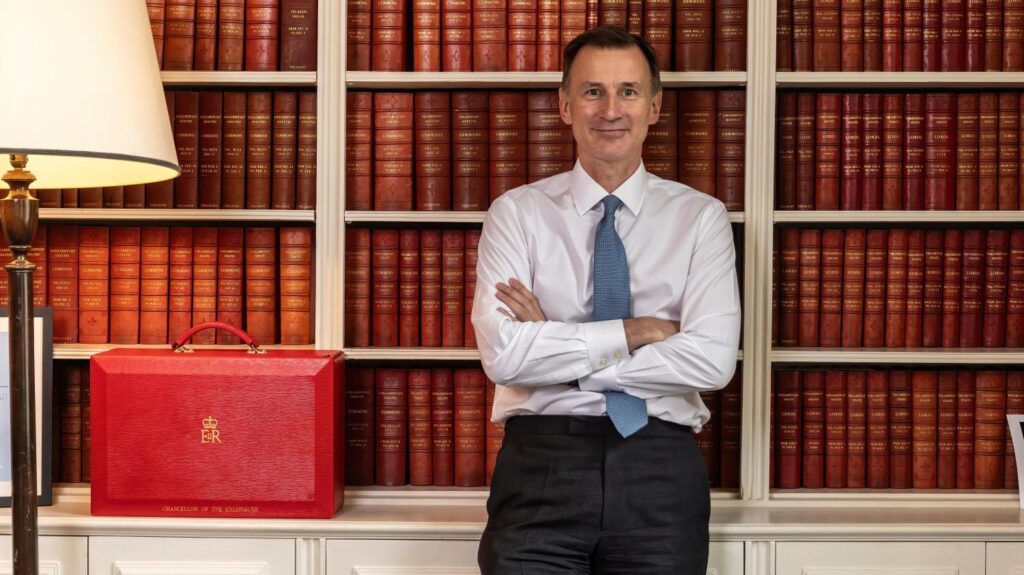While many envision a life of luxury and privilege behind the iconic black doors of Downing Street, Chancellor Jeremy Hunt offers a more down-to-earth perspective.
“My mornings begin at 6 a.m. in the Rose Garden with my dog and a poo bag in hand,” he reveals. Interestingly, he hasn’t crossed paths with Sunak and his canine companion, Nova, during these outings.
A year after stepping into the role at No 11, following the economic turmoil of Liz Truss’s mini-budget, Hunt is acclimating to the unique environment of Downing Street.
“It’s quite endearing to have children playing around while working. Having family close by is a comforting aspect of living above No 11,” he reflects.
“It’s truly an honor. Both residing families have children of similar ages, and they get along splendidly. Despite the challenges, we’re grateful for the experience.” On a lighter note, he jests about the only downside, “My wife knows exactly where to find me for any little thing.”
Despite murmurs suggesting Hunt’s approach isn’t sufficiently political, his role as chancellor seems secure, especially given his stabilizing influence. As the conference nears, Hunt is keen on championing Britain’s potential. While some Conservatives are wary of excessive optimism after Boris Johnson’s “sunlit uplands” promise, Hunt feels it’s time for the nation to shed its inherent skepticism and embrace a brighter outlook.
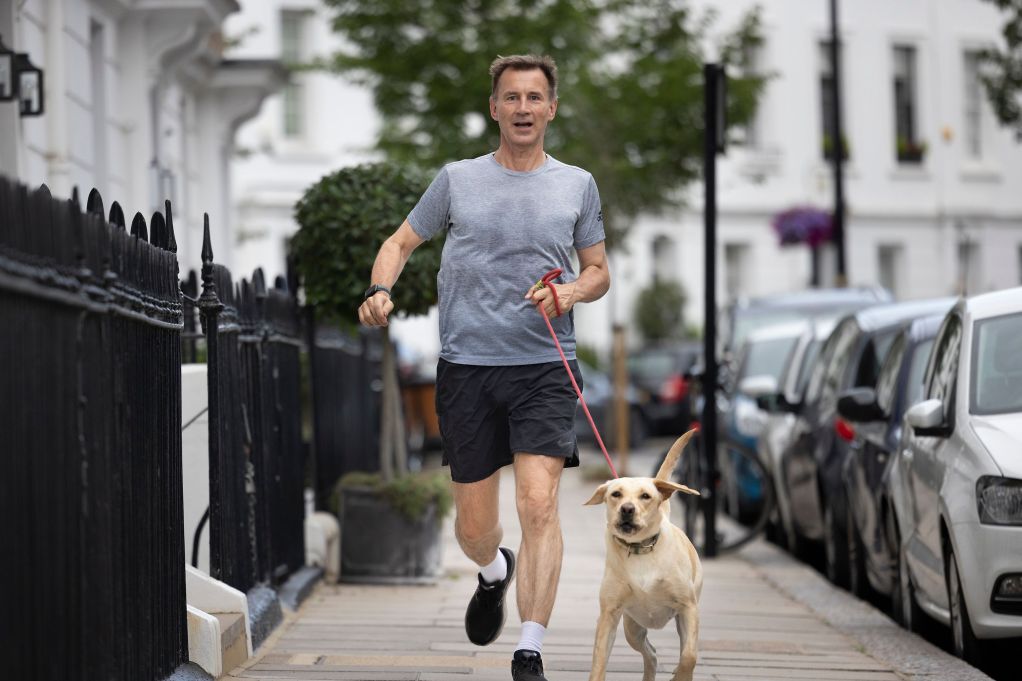
Hunt keeps his feet on the ground by exercising his dog, Poppy, at 6am every morning
“When I first took on this role, there was a prevailing sense of pessimism about Britain and our future,” Hunt reflects. “Now, almost a year later, I believe we’ve been too caught up in this defeatist mindset. If we examine the core of the British economy, despite the challenges we’ve faced, our growth rate surpasses other major European nations. This growth has been consistent not just post-pandemic or post-Brexit, but since 2010.”
He emphasizes the resilience of the British economy, pointing out that it has weathered significant challenges, including a once-in-a-century pandemic, a global financial crisis, and an energy crisis reminiscent of the 1970s. Hunt is particularly optimistic about sectors like technology, film and television, and life sciences, where the UK has shown strength and potential for rapid growth in the coming century.
“We have ample reasons to be optimistic about our future,” Hunt asserts. “It’s high time we shed the inherent British pessimism that we’re known for.”
For a while, the government’s focus has been primarily on Sunak’s five key areas concerning the economy, the NHS, and immigration. The central promise was to cut inflation by half, a goal Hunt is confident will be achieved. Both Sunak and Hunt are striving to find a middle ground, acknowledging the challenges people face due to rising living costs while also instilling hope for a brighter future.
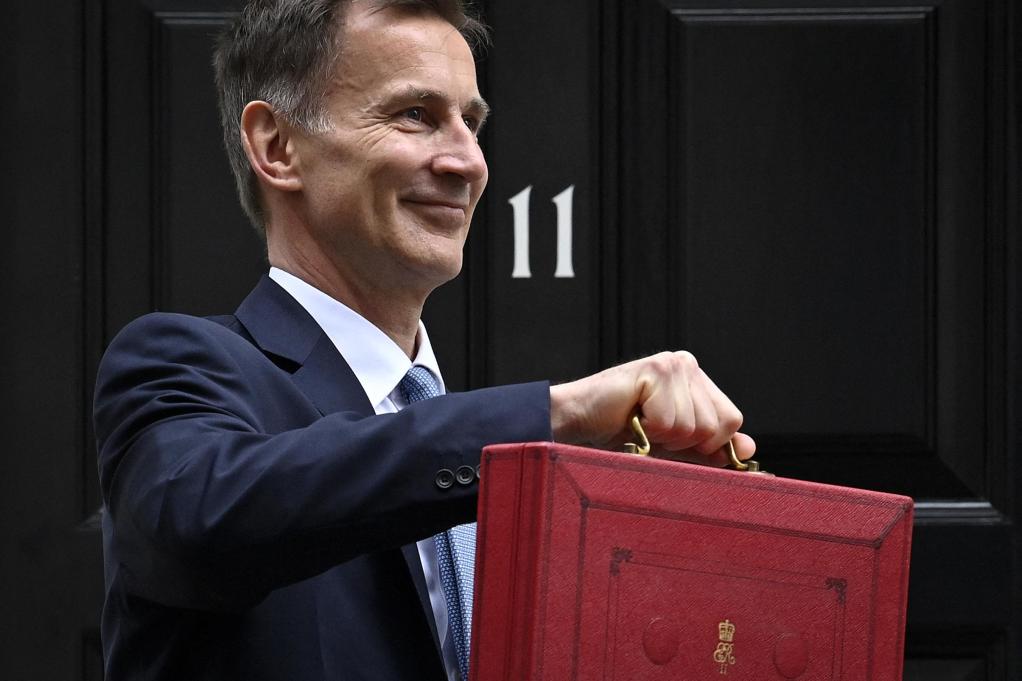
Hunt’s optimistic message is that the British economy is the fastest growing of any large country in Europe
Hunt points to the Bank of England’s forecasts, noting, “By this time next year, the Bank predicts inflation to be under 3% and we can anticipate a decline in interest rates.” He expresses optimism, suggesting that “people will recognize the effectiveness of our strategy and feel more secure about their own and their family’s financial future. It’s entirely plausible that we might witness a consistent rise in real wages.”
However, the issue of taxation looms large for Hunt. Recent findings from the Institute for Fiscal Studies indicate that taxes are set to surge at an unprecedented rate during this term, translating to an additional burden of around £3,500 for every household. This has caused unease among the more conservative members of the Tory party, who are increasingly vocal about their desire for tax reductions.
Hunt acknowledges the concern, posing the question, “Is our nation destined to see an endless rise in taxes?” He emphasizes the importance of addressing this issue, stating, “The party that can provide a believable solution to this question will likely earn the public’s trust in the upcoming elections.”
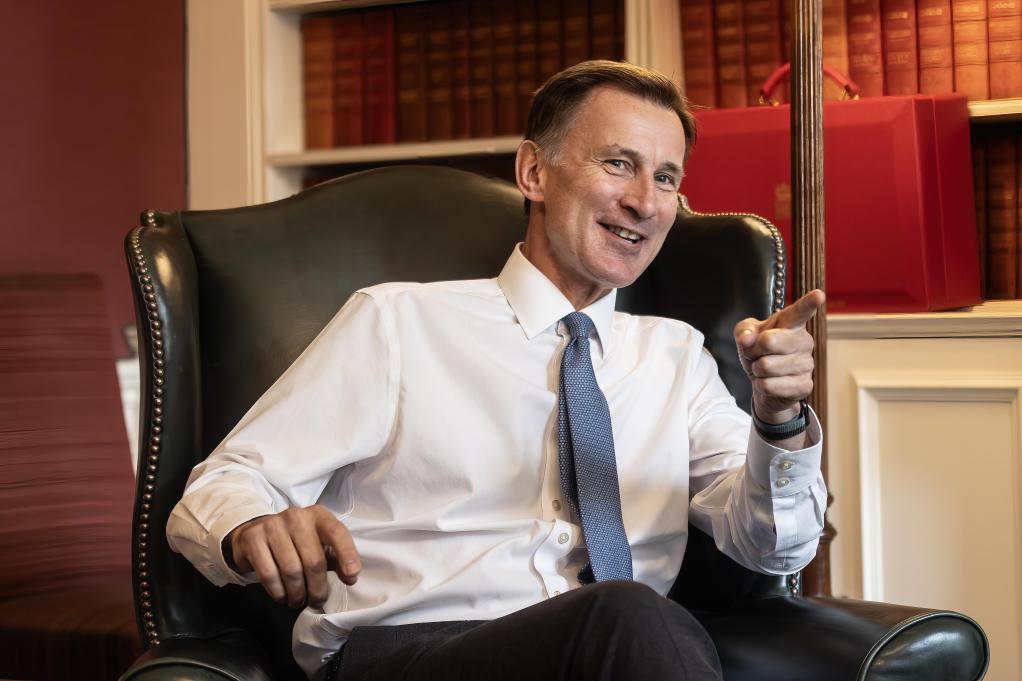
Add Your HeaTechnology, particularly AI, will dramatically transform public services, Hunt saysding Text Here
Hunt believes there’s a chance to shift the current paradigm. He has initiated the process by reaching out to his fellow cabinet members, urging them to assess the amount of time wasted on redundant administrative tasks. He anticipates revealing a strategy to address this in the upcoming autumn statement.
Hunt argues, “Improving public services doesn’t always mean hiring more staff. Post-pandemic, there seems to be a misconception in the public sector that better service delivery equates to more personnel. This mindset needs to change, not just in the NHS but across all public services.” He envisions technology, especially artificial intelligence, as a game-changer, though it will necessitate initial investments.
He observes a recurring pattern: “Historically, when departments face budget constraints and the Treasury enforces budget limits, the first casualties are often IT projects. Ironically, these are the very initiatives that could enhance the efficiency of public services.” Hunt emphasizes that both the Treasury and various government departments need to reevaluate their approaches.
He anticipates profound changes, stating, “We’re on the brink of the most significant overhaul of public services in our generation. With the tools now at our disposal, we can achieve unprecedented transformations. Leaders from major AI companies, like Google and Microsoft, consistently highlight the potential of AI to revolutionize public sector operations, mirroring its impact on the private sector.”
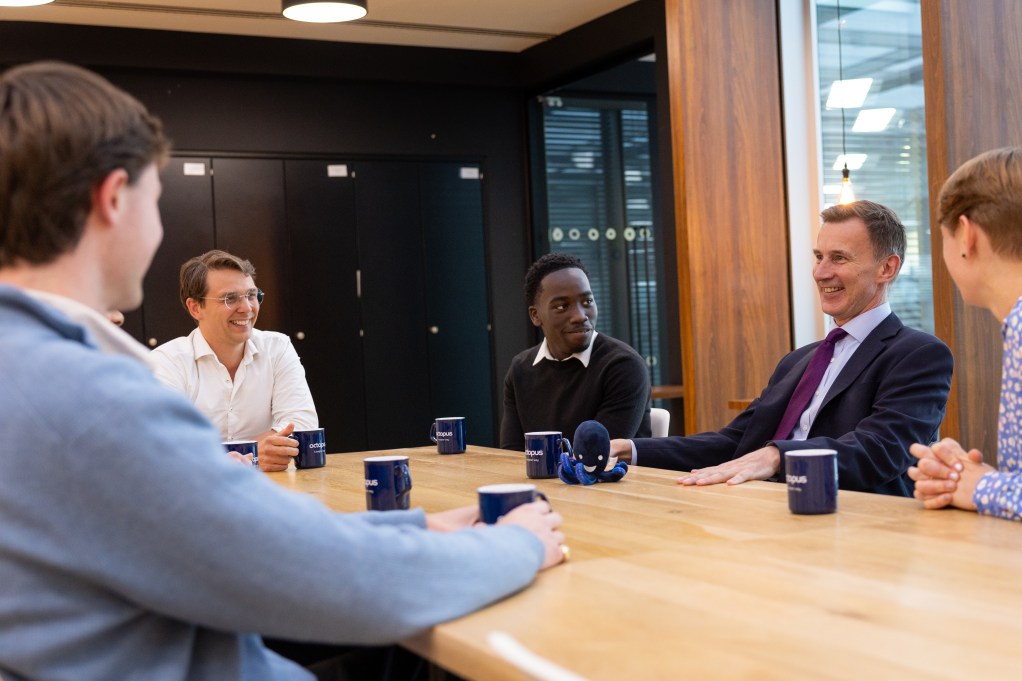
Hunt says one of his greatest achievements is that it is now possible to earn £1,000 a month without paying tax or national insurance
Jeremy Hunt acknowledges the potential of Artificial Intelligence (AI) in various sectors, even if he remains somewhat skeptical about it being the ultimate solution. He suggests, “For educators, AI can drastically cut down the hours they spend grading. For law enforcement, AI can provide insights on potential crime hotspots. In healthcare, AI can assist medical professionals in making precise diagnoses and prevent medication errors.”
Hunt also addresses the rising benefits expenditure in the UK, pointing out that around 100,000 individuals annually transition from employment to relying solely on state benefits, without any mandate to seek employment. A significant portion of these individuals exit the workforce due to mental health issues. Hunt expresses concern over both the economic implications and the long-term well-being of these individuals.
He states, “While we pride ourselves on our societal safety net, the current system doesn’t seem to serve either the economy or its beneficiaries effectively.” Hunt emphasizes the need for early mental health interventions and strategies to reduce the number of individuals indefinitely excused from work due to health reasons.
Hunt believes the system is overly procedural and not outcome-focused. He says, “Our goal should be to significantly reduce the number of individuals indefinitely excused from job-seeking. This isn’t beneficial for them or the economy.”
Regarding the welfare system, Hunt suggests a balanced approach of incentives and regulations. He believes that if public services become more efficient and more people are employed, it could pave the way for tax reductions.
Hunt reveals, “I inquired with the Treasury about what’s needed to stabilize the tax-to-GDP ratio. Their response was straightforward: a 0.5% increase in public sector productivity growth annually.” While he remains open-minded about which taxes might be reduced, he acknowledges the concerns associated with inheritance and income taxes.
When asked about the Tories’ commitment to the triple tax lock, which promises no hikes in income tax, VAT, or national insurance, Hunt responds, “Despite the challenges over the past decade, we’re proud that as of last month, one can earn up to £1,000 monthly without any tax or national insurance deductions. We’ve significantly reduced the tax burden on the lower-income bracket. I aim to reduce taxes for everyone.”
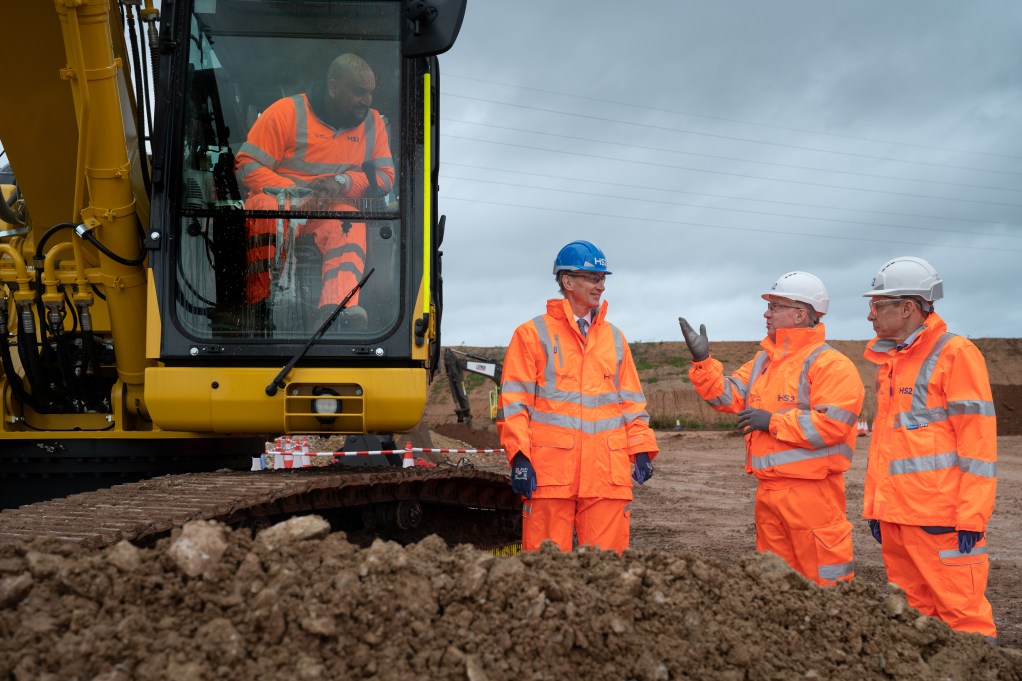
Previously a stalwart supporter of HS2, Hunt admits that he will need to find a solution to its spiralling costs
Another pressing concern for Hunt, which he will address in his upcoming statement, is the escalating costs of HS2. While Hunt has previously been a staunch supporter of the project, asserting earlier this year that HS2 would undoubtedly reach Euston and that the government was unwavering in its commitment to all its rail plans, he now seems more cautious.
When questioned about the possibility of his previous statements being inaccurate given the rising costs, Hunt responds, “I based my comments on the information available at the time. However, the reality is that expenses have surged. As the chancellor, it’s imperative for me to discuss this with the Prime Minister. We need to present a viable solution to the nation.”
Hunt emphasizes, “The public expects transparency about the challenges we face and practical solutions. That’s the leadership they’ll receive under Rishi Sunak. We won’t resort to evasive decisions.” Hunt is known to be close to former Prime Minister David Cameron, who opposes any cutbacks to HS2. When asked if Cameron has approached him directly on the matter, Hunt remains tight-lipped, stating, “I won’t divulge private conversations with friends.”
Profile Snapshot:
Date of Birth: November 1, 1966
Education: Attended the prestigious Charterhouse School and later pursued PPE at Oxford University.
Professional Journey: Co-founded Hotcourses, the UK’s leading publisher of educational guides and websites. Became MP for South West Surrey in 2005 and was appointed Culture Secretary in 2010. He holds the record for the longest tenure as Health Secretary from 2012 to 2018, after which he was elevated to Foreign Secretary. However, he was dismissed after losing to Boris Johnson in the 2019 leadership race.
Recent Endeavors: Supported Rishi Sunak in the last leadership race but was appointed Chancellor by Liz Truss after Kwasi Kwarteng’s departure. He continued in this role even after Truss’s resignation.
Personal Life: Has been married to Lucia Hunt since 2009, and they are blessed with three children: Eleanor, Jack, and Anna.

